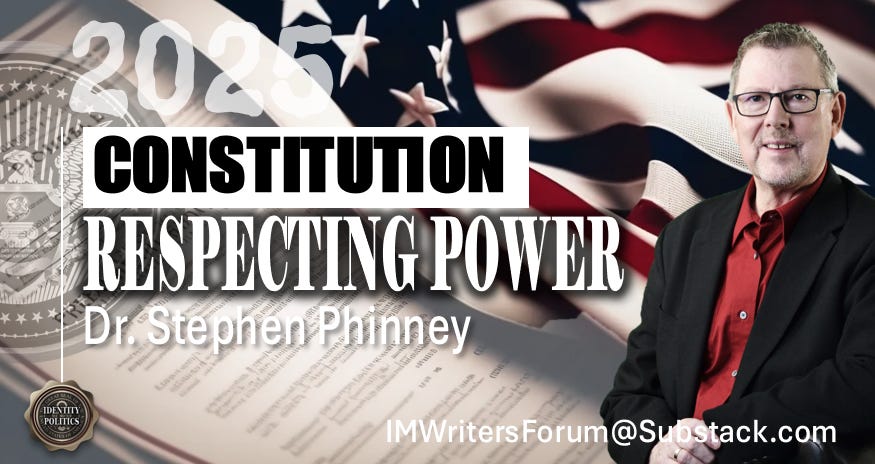The IM Writers Association. We aim to create a community of writers who share a common faith and passion for writing that advances the Life of Jesus Christ. Consider assisting us with our costs - a safe donor link is available HERE. #65 The Constitution | Respecting PowerDr. Stephen Phinney: Citizens have a vital role in upholding the principles outlined in Section 7 and respecting governing authorities.Listen to the podcast version: Section 7 of the United States Constitution and Biblical Respect for Governing Powers.IntroductionSection 7 of the United States Constitution outlines the legislative process and the passage of bills, resolutions, and vetoes. It is a fundamental component of the checks and balances system, ensuring that no single branch of government wields excessive power. In examining this section, it is essential to consider the Biblical principles that call for respect and obedience to governing authorities. This essay will explore the intersection of these Constitutional provisions with Biblical teachings, emphasizing citizens' responsibilities to honor and respect their governing powers. Section 7 of the Constitution: An OverviewSection 7 of the Constitution is divided into three clauses. The first clause details the process for revenue bills, stating that such bills must originate in the House of Representatives but may be amended by the Senate. The second clause describes the procedure for the passage of general bills, highlighting the President's role in either approving or vetoing legislation. The final clause addresses the requirements for joint resolutions. Biblical Teachings on Respect for AuthoritiesThe Bible contains several passages that emphasize the importance of respecting and obeying governing authorities. Romans 13:1-2, for instance, states: "Let every person be subject to the governing authorities. For there is no authority except from God, and those that exist have been instituted by God. Therefore whoever resists the authorities resists what God has appointed, and those who resist will incur judgment." This passage underscores the belief that all authorities are established by God, and citizens have a moral duty to respect and obey them. Similarly, 1 Peter 2:13-17 encourages believers to submit to every human authority for the Lord's sake, whether it be the emperor or governors. This passage reinforces the idea that respecting governing powers is an act of obedience to God. The Intersection of Section 7 and Biblical PrinciplesSection 7's legislative process reflects the principles of accountability and balance, which align with Biblical teachings on governance. The system of checks and balances ensures that no single entity can dominate the legislative process, promoting fairness and justice—values that are deeply rooted in the Bible. Furthermore, the requirement for the President to either approve or veto legislation demonstrates the importance of executive oversight. This mirrors the Biblical concept of leadership accountability, as seen in passages such as Hebrews 13:17, which states: "Obey your leaders and submit to them, for they are keeping watch over your souls, as those who will have to give an account." It is estimated that only 7% of American citizens believe in the Biblical model of honoring all authority, and this poses a significant challenge to the cultural fabric of the nation.This model, rooted in teachings such as Romans 13:1-2, which emphasizes that all governing authorities are established by God, and thus should be respected and obeyed, highlights a foundational principle of social order and moral responsibility. The erosion of this belief can lead to widespread mistrust, cultural wars, and disrespect for governance and institutions, igniting societal discord and instability. When citizens neglect to honor and respect those in authority, it undermines the principles of unity, cooperation, and accountability, which are essential for a healthy and functioning society. Consequently, this gap in belief and practice reflects a deeper issue within the cultural and ethical landscape of America, necessitating a return to values that promote respect, order, and collective responsibility. Plus, if only 7% of America’s citizens honor ALL authority, that means 93% are dishonoring God (Romans 13:2). Is America dishonoring God? That would be a “yes.”Citizens' ResponsibilitiesCitizens have a vital role in upholding the principles outlined in Section 7 and respecting governing authorities. By engaging in the legislative process, voting, and holding leaders accountable, citizens demonstrate their commitment to the principles of justice and governance. Additionally, by respecting the outcomes of this process, whether they agree with them or not, citizens honor the Biblical call to obedience and respect for authority. Section 7 of the United States Constitution is a testament to the principles of accountability, fairness, and balance in governance. When viewed through the lens of Biblical teachings, it becomes clear that citizens have a responsibility to respect and uphold these principles. By doing so, they honor both their civic duties and their spiritual obligations, promoting a just and orderly society. In order to get America back on track, it is essential for all citizens to embrace the teachings of Romans 13:1-2 by honoring all existing authorities.This Biblical principle reminds us that God institutes every governing authority, and our duty is to respect and obey them. By acknowledging and upholding this mandate, we can honor and build a culture of unity, cooperation, and accountability. Such a shift in perspective can help mend the societal rifts that arise from mistrust and disrespect towards governance, ultimately promoting a more harmonious and well-functioning society. Embracing this value is a crucial step towards restoring order and stability in America. According to statistics, the odds of most readers taking practical action on this are likely next to none. But I am hopeful. Dr. Stephen Phinney is a theologian, author, and speaker with a passion for helping individuals discover their true identity in Christ. His extensive knowledge and compassionate demeanor make him a guiding light for those seeking to understand the depths of spiritual transformation.Judge Mark T. Boonstra & Dr. Phinney are co-writers of the Identity Politics series. Their mission is to reestablish the founding father’s faith and commitment to building one nation under God.IM Writers Association is a collective group of Christian writers who support the advancement of the Gospel of Jesus Christ while sustaining an eschatological view of the Holy Scriptures of God. |






